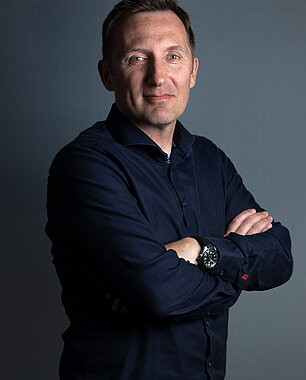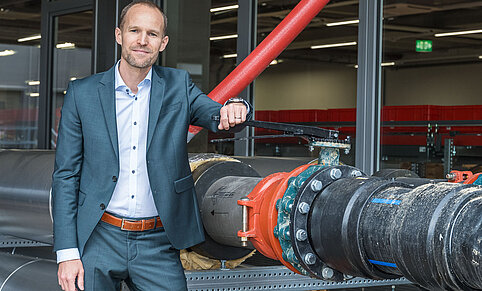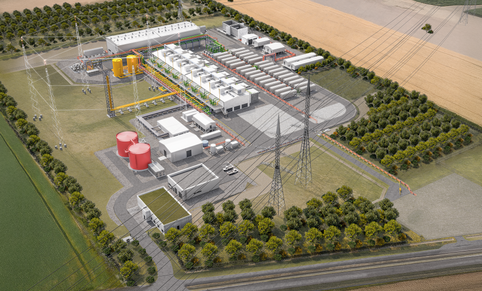 © Aylin Narli
© Aylin Narli
- Location advantages
- Success story
- Research & development
- News
United Micro Develops 5G Modem Chips in Austria for IoT
13. December 2023High-frequency microchips are manufactured in Linz, Upper Austria, a RF chip development hotspot for mobile telephony and radar. This is how one can summarise the operations and selection of a business location by United Micro Technology, an international startup headquartered in China. What led to this local specialisation which Apple, Infineon, Bosch and others rely upon?
Questions posed to Thomas Lüftner, Member of the United Micro executive leadership team as Vice President for RF and Programs, Managing Director of United Micro Technology GmbH.
What is your role at United Micro Technology? What does a Vice President for RF and Programs actually?
As the Co-Managing Director of United Micro Technology GmbH, I developed our three European facilities in Munich, Dresden and Linz in collaboration with my colleague Bernd Eggers. My daily tasks include operational management for finance, legal, human resources and communications.
In my other capacity as Vice President for RF, I am responsible for heading our high-frequency chip development in Linz. This involves tasks such as building up and leading the team, external partner management, identification of innovation possibilities and ensuring that our technologies fulfill current market requirements and are continuously upgraded. My work as VP for Programs arose thanks to my previous experience at Intel and aims at ensuring the smooth integration of modem technologies for our 5G modem chipset product lines. The advantage is that we can implement a holistic approach at United Micro across the globe via our six development sites. This enables us to not only take account of technological aspects but also social, market-related and regulatory demands from the very beginning.
What was the basis for establishing United Micro Technology in August 2022 and in which countries do you operate?
As former Intel colleagues with considerable experience in the field of microelectronics, we wanted to create something new. The basic reason for setting up the company at six locations last year can be attributed to our team of founders living on three continents. Naturally the strategic approach plays a role. The decision to establish facilities in Europe (Linz, Munich, Dresden), China (Xian, Shenzhen) and the USA (Austin) enables United Micro to leverage various talents and resources from our local networks which we built up during our work for Infineon and Intel, and also strengthen our global presence.
How would you describe the company’s business activities in Austria? Where are the chips produced by United Micro used and why do they stand out from the competition?
Our development centre for high frequency technology was established in Linz. We offer solutions for the global market for 5G IoT, from PC to Automotive & Industrial, and stand out thanks to our focus on IoT. Other companies such as Mediatek and Qualcomm also develop modems for smart phones.
Why did you decide in favour of the Austrian business location`? Do you think there is a unique selling proposition i.e., an advantage for companies which can only be found in Linz (or in Austria)?
Linz is not only my hometown but is also characterized by a strong ecosystem for high frequency technology. Companies such as Apple, Infineon and Bosch are located here and operate development centres for RF chip development. Last but not least, Silicon Austria Labs also conducts research on high frequency technologies here with a focus on 6G. The hotspot in Linz is unique in the world. All in all, these factors comprise sufficient reasons for a young startup to set up business operations here.
Infineon and Apple have large development centres for integrated HF circuits in Linz. Many of the world’s leading companies in this field are located throughout Austria, including ams OSRAM, AT&S, NXP, IMS Nanofabrication and EV Group. From your point of view, how did the country manage to become a real hotspot for microelectronics?
The founding of the first microelectronic firms in Austria dates back to initiatives undertaken by state-owned industries by former Federal Chancellor Bruno Kreisky. As a result, AT&S and AMS AG were established in Southern Austria. In contrast, the ecosystem in Linz developed independently. The cornerstone for the founding of the first microchip companies in Linz was laid by the financing as well as the entrepreneurial activities of individual persons. We here at United Micro want to follow in their footsteps.
What is your impression now when you look back at the company founding? What kind of support (public and private) did you receive?
I think that we can be very proud of what we were able to achieve in such a short time. The founding of a startup for modem chips is a formidable challenge due to the high startup costs and the complexity of setting up teams. Wide-ranging expertise is required, especially in this industry. Our success is not only due to longstanding experience but above all teamwork and mutual trust for one another. Furthermore, we could rely on the commitment and investments of partners and private investors whose expertise and resources significantly contributed towards translating our vision into reality and serving as the basis for pressing ahead with the growth of United Micro. Up until now we have not needed any public sector financing, but we highly value the infrastructure of the Johannes Kepler University Linz and our current home in the Open Innovation Center located on the JKU Campus.
What role do partners and partnerships in the field of research and science play for your company at the business location in Upper Austria? You yourself worked for Silicon Austria Labs.
Silicon Austria Labs is carrying out 6G research which is very relevant to us. Thanks to this collaboration, we can safeguard our innovation pipeline and at the same time create new and exciting jobs for young talents in Linz. This is very important in order to remain competitive in a dynamic market environment.
How many employees do you have in Linz and how many different countries do they come from? What kind of HR support did you receive from ABA?
On balance, we will have a team of 20 employees in the new year benefitting from the diversity offered by nine different nationalities. Several of our team members actually moved directly to Linz from abroad to work for us. ABA offers extensive guidance on its website, especially with respect to procedures involving visa and work permits which can be complex in the beginning. Clear answers to FAQs considerably facilitate the entire process and contribute to the smooth start in our company on the part of our international employees.
In your opinion, what is the importance of the semiconductor industry in Europe? How will the European Chips Act impact both the EBS sector on the continent and United Micro?
In the meantime, Europe has realised that the semiconductor industry is of systemic relevance to the continent’s global competitiveness and thus to its sustainable prosperity. This not only involves the issue of supply chain reliability for existing industry but much more i.e., to make sure that Europe is globally relevant when it comes to technologies of the future such as AI, supercomputing and 6G. Europe is becoming less and less important in the race for technological leadership which has long since been assumed by the USA and above all China. For this reason, the European Chips Act is an urgent and necessary measure. Whether or not the measure turns out to be sufficient remains to be seen. At United Micro we leverage the best of both worlds. Thanks to our footprint in China, we can take advantage of the dynamic nature of the Chinese market. In turn, our European facilities enable us to make use of the ongoing high level of engineering expertise in Germany and Austria. We hope that the European Chips Act will also inspire many young talents to decide in favour of being trained in the field of microelectronics.
One last question: what do you personally value the most about Austria?
In particular, I very much appreciate the dynamic development of Linz over the last 20 years. The city has become very internationalized during this time, which is a remarkable thing, and is increasingly attracting international students and skilled workers. Naturally I enjoy the beauty of the countryside and the feeling of security and freedom which Austria offers.



